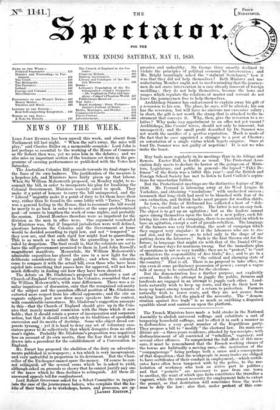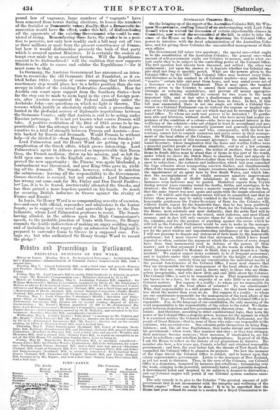The French Ministers have made a bold stroke in the
National Assembly to abolish universal suffrage and substitute a sort of taxpaying household suffrage, and to effect it in such a manner as to disfranchise a very great number of the Republican party. They propose a bill to " modify " the electoral law. Its main con- ditions are—a three-years residence, attested by tax-receipts; with disfranchisement of all convicted of "rebellion," vagrancy, and several other offences. To comprehend the full effect of this mea- sure, it must be remembered that the French working classes of the towns are habitually a moving race,—the institution of the " oompagnonage " being perhaps both a cause and a consequence of that disposition ; that the workpeople in many trades are obliged to have certificates of their conduct in employment,—which certifi- cates have often been tampered with by the police, to the mo- lestation of workmen who took an active part in politics ; and that " permits " are necessary to pass from one town to another, the want of which ipso facto constitutes the traveller a vagrant, while the utmost necessity for employment fails to extort the permit, so that destitution will sometimes force the work- man to defy the law : also that, under pretext of this corn- pound law of vagrancy, large numbers of " vagrants " hive been removed from towns during elections, to lessen the numbers of the Socialist or Dessaseatic liter; finally, that a Democratic is- surrection would have lie effect, under this boll, of tlisfranchilki. g all the opponents .of the existisg Government who coda be ern- victed of rising. Vemembering these facts, 'the reeler is in a 'posi- tion to perceive, not only how readily such a bill may cut off two or three millions or more from the present constituency of France, but how it would disfranchise precisely the bulk of that party which is arrayed against Ministers. It is certainly the coolest at- tempt ever made by an ascendant faction. Will the Republicans consent to be disfranchised? will the coalition that now supports Ministers be able to coerce and subdue the Republicans ?—for it must come to that.
In Germany, the Austrian Government has announced an inten- tion to reeonvoke the old Germanic Diet at Frankfort, as it ex- isted before 1815 ; Austria of course supposing that this violent reactionary step would place her in a better position than she can occupy in either of the existing Federative Assemblies. How far Austria can count upon support from the Southern States—how far the step can be made to seem legal in the eyes of foreign pow- ers, after Austria recognized the Federal Assembly under the Archduke john—are questions on which no light is thrown. The reasons which justify or absolutely stultify such a proceeding are buried in the profound secrecy of diplomatic negotiations between the'Germanic Courts ' • only that Austria is said to be acting under Russian patronage. It is not yet known what course Prussia will take. A positive restitution of the Diet of 1815 seems to be im- practicable ; but the attempt may be only made as the formal pro- vocative to a trial of strength between Prussia and Austria—Aus- tria backed by Russia and Denmark. Would Prussia be without help—if she invited it—from Hungary, Italy, or even Sweden ?
Lord Palmerston and Sir Henry Ward are getting up a joint complication of the Greek affair, which grows interesting. Lord Palmerston's agent in Athens proved so impracticable that Baron Gros, the French mediator, threw up his mission, and so left the field open once more to the English envoy. Mr. Wyse duly im- proved the new opportunity : the Pincus was again blockaded, a bombardment was threatened, and poor King Otho gave in, yield- ing all the demands. The Senate, however, refused to sanction the submission; leaving all the responsibility to the Government. Greece therefore is coerced, but not subdued : Lord Palmerston has wrung out some cash for Mr. Finlay and Don David Pacifico ; bill- has, it is to be feared, irretrievably alienated the Greeks, and has thus gained a more hopeless quarrel on his hands. So much for securing British influence in Greece against the rivalry of France and Russia!
In Ionia, Sir He Ward is _so compounding severity of coercion, free-and-easy talk official, reproaches and admissions to the Ionian Senate, as to suggest very novel and agreeable hopes to the Pan- hellenists, whom Lord Palmerston professes to resist. The Senate having alluded, in the address upon the High Commissioner's speech, to the probable junction of Ionia with Greece, Sir Henry commits the double indiscretion of making an angry scolding reply, and of including in that angry reply an admission that England is prepared to surrender Ionia to Greece in a supposed case. Per- haps so ; but who authorized Sir Henry George Ward to record the pledge ?



























